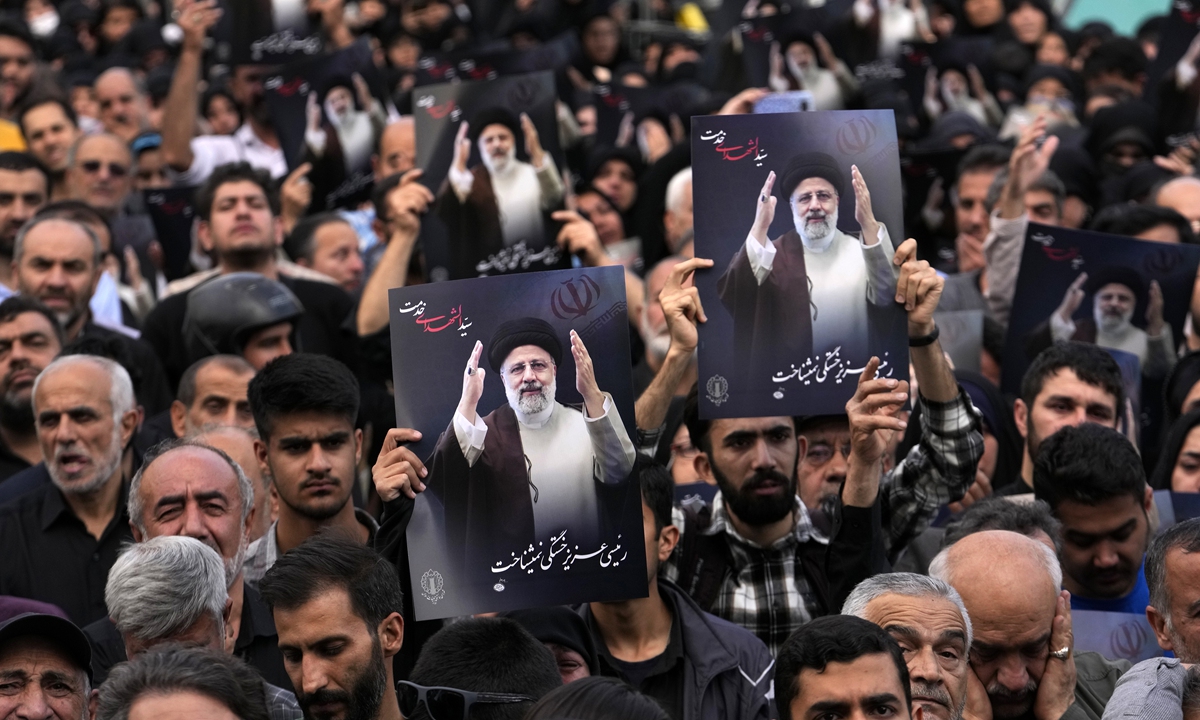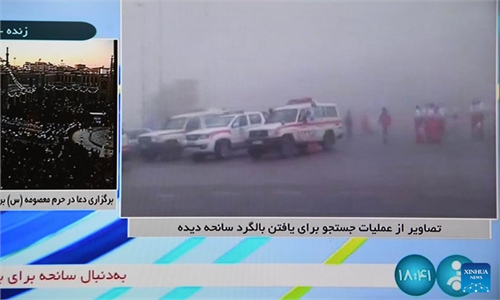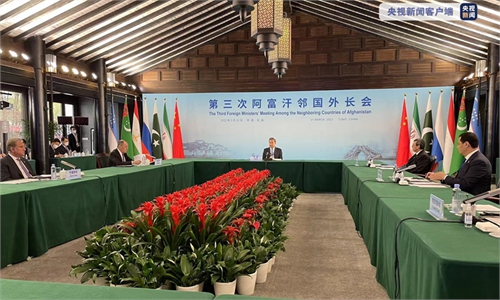
The international community has extended condolences on Monday to Iran following the tragic helicopter crash that claimed the life of Iranian President Ebrahim Raisi, along with Foreign Minister Hossein Amir-Abdollahian and several other officials.
Chinese President Xi Jinping on Monday sent a message of condolence to Iran's First Vice President Mohammad Mokhber following the unfortunate death of Raisi in the accident, saying Raisi's tragic death is a great loss to the Iranian people, and the Chinese people also lost a good friend.
The unexpected death of Raisi may cause temporary vacancy for the successor to Iran's Supreme Leader and cause ripples to the internal power structure, yet the country's political structure can still ensure the country's normal functioning despite the incident, preventing it from descending into chaos. Experts believe Iran's foreign and domestic policies won't undergo major changes. However, the incident may temporarily stall negotiations between Iran and the US, bringing more uncertainty to the conflicts in the Middle East.
On behalf of the Chinese government and the people of China, Xi expressed deep condolences and extended sincere sympathies to Mokhber, the family of President Raisi, and the Iranian government and people.
Xi said that since President Raisi took office, he made important contributions to maintaining Iran's security and stability and promoting national development and prosperity. He added that Raisi also made positive efforts to consolidate and deepen the China-Iran comprehensive strategic partnership.
The Chinese government and Chinese people cherish the traditional friendship between China and Iran, Xi said, noting that with the joint efforts of both sides, the China-Iran comprehensive strategic partnership will continue to consolidate and develop.
China also expressed deep condolences for the tragic death of Iranian Foreign Minister Hossein Amir-Abdollahian, who was on the same helicopter with Raisi, and extended sincere condolences to Amir-Abdollahian's family, Chinese Foreign Ministry Spokesperson Wang Wenbin said at Monday's regular press briefing.
During a joint press briefing with Kazakhstan's Deputy Prime Minister and Foreign Minister Murat Nurtleu in Astana on Monday, Chinese Foreign Minister Wang Yi said that Raisi and Amir-Abdollahian made significant contributions to the development of China-Iran relations and the promotion of regional friendly cooperation.
China has actively assisted in the search and rescue efforts following the accident and is ready to continue providing any necessary support to Iran, Wang Yi said, adding that he believes that the Iranian government and people will get through this difficult time.
Raisi and the Iranian top diplomat were killed on Sunday in a helicopter crash resulting from a "technical failure," Iranian state news media reported.
Raisi was traveling in Iran's East Azerbaijan province. State TV said what it called a "hard landing" happened near Jolfa, a city on the border with the nation of Azerbaijan, some 600 kilometers (375 miles) northwest of the Iranian capital, Tehran, according to the Associated Press.
Iran has declared five days of national mourning, according to local media reports.
Following the incident, Iran's Supreme Leader Ayatollah Ali Khamenei said in an address on state TV that "There will be no disruption in the country's operation … Senior officials are doing their work and I have advised them on the necessary points and all of the country's operation will carry on smoothly and orderly."
Mokhber, 68, has been appointed as Iran's interim president following the death of Raisi. Mokhber now leads a three-person council responsible for organizing a new presidential election within 50 days, media reported.
Many countries and organizations sent their condolences after the incident. UN Secretary-General Antonio Guterres on Monday conveyed condolences to Iran over the deaths of Raisi and other senior government officials in the tragic helicopter crash. Members of the UN Security Council on Monday observed a minute of silence in memory of Raisi and his entourage who were killed in the helicopter crash.
"With profound sadness and deep sorrow, we received the tragic news of the passing of the President of the Islamic Republic of Iran, Ibrahim Raisi, the Minister of Foreign Affairs, Hossein Amir Abdollahian, and their companions, due to the unfortunate plane crash incident in northern Iran," Iraqi Prime Minister Mohammed Shia' al-Sudani said in a statement.
Leaders from Qatar, India, Pakistan, Russia along with other countries also expressed their condolences.
Short-term impact
Raisi, the 63-year-old political heavyweight, had long been regarded as the natural successor to Supreme Leader Khamenei, the highest authority in Iran, Al Jazeera reported.
The biggest impact brought by Raisi's death would be the temporary vacancy of the successor to Iran's Supreme Leader, Wang Jin, an associate professor at the Institute of Middle Eastern Studies at Northwest University in Xi'an, told the Global Times. Wang noted that Raisi had deep connection and abundant experience in the judiciary and religious arena; moreover, his background and personal style are in line with the expectations for successor of Iran's Supreme Leader.
Raisi maintained a consistent stance with Khamenei on various international and domestic issues, taking a hardline stance on issues such as the Iran nuclear issue; tough on the West and Israel, and Middle East strategic issues, analysts said.
Death of Raisi is expected to have a significant impact on the internal power structure in Iran. Raisi was considered a key figure in Iran's conservative camp, and his passing may trigger large-scale personnel reshuffle within the conservative faction, or exacerbate internal power struggles, Wen Shaobiao, an expert from the Shanghai International Studies University, told the Global Times.
However, Chinese experts believe that overall, Iran's normal operation won't be rattled by Raisi's death, and the country's policies on major issues will remain the same.
Iran's political system, with Ayatollah Ali Khamenei leading the political landscape and with the constitutional procedures in place in the event of absence of the president, ensures that Iran is unlikely to experience the kind of political instability seen in some developing countries where the political system is not robust. The likelihood of the country descending into political turmoil due to the incident is relatively small, Liu Zhongmin, a professor from the Middle East Studies Institute of Shanghai International Studies University, told the Global Times.
Diplomatic trajectory unchanged
The accident also occurred when Iran was placed in crucial foreign environment. Its conflict with Israel escalated when Iran launched missile attacks on Israel following Israel's bombing of the Iranian embassy building in April.
Two top Biden administration officials held indirect talks with Iranian officials in Oman last week on how to avoid escalating regional attacks, Axios reported, citing two sources with knowledge of the talks.
US President Joe Biden was briefed on the Iranian president's helicopter incident, according to White House press secretary Karine Jean-Pierre on Sunday. The State Department was closely following reports of the incident, a spokesperson said Sunday.
Both Raisi and Amir-Abdollahian are crucial figures in Iran's diplomatic circles, thus it takes time for their successors to familiarize and adjust. During this time, Iran may reduce its involvement in foreign affairs, as it needs to focus on electing a new president, said Wen, noting that Tehran's talks with Washington are likely to come to a halt and bring more uncertainty for de-escalating conflicts in the Middle East.
Raisi paid a state visit to China in February 2023. That trip was Raisi's first state visit to China and the first by an Iranian president in 20 years, according to Iranian state media.
After his visit to China, Raisi said Iran's foreign policy is to build trust in neighbors and economic convergence in Asia, emphasizing that "the trip to China was very important in order for Iran to play an effective role in the field of regional and global economic and commercial issues, because China is one of the world's largest economies that plays an important role in the field of trade in Asia and the international stage," Xinhua reported.
In 2023, Saudi Arabia and Iran announced the resumption of diplomatic ties thanks to China's successful mediation. Amir-Abdollahian and Saudi Arabian Foreign Minister Prince Faisal bin Farhan Al Saud also traveled to Beijing for a meeting of resuming ties in April 2023.
During Raisi's presidency, Iran's relations with the West continued to deteriorate, while its ties with China and Russia grew stronger through its "Look East" policy. This strategic shift has been consistent across multiple administrations and aligns with Iran's long-term interests, thus the recent passing of Raisi and Amir-Abdollahian is unlikely to change Iran's cooperation with China, nor will it alter Iran's overall diplomatic trajectory, Tian Wenlin, a professor at School of International Studies of the Renmin University of China, told the Global Times.




